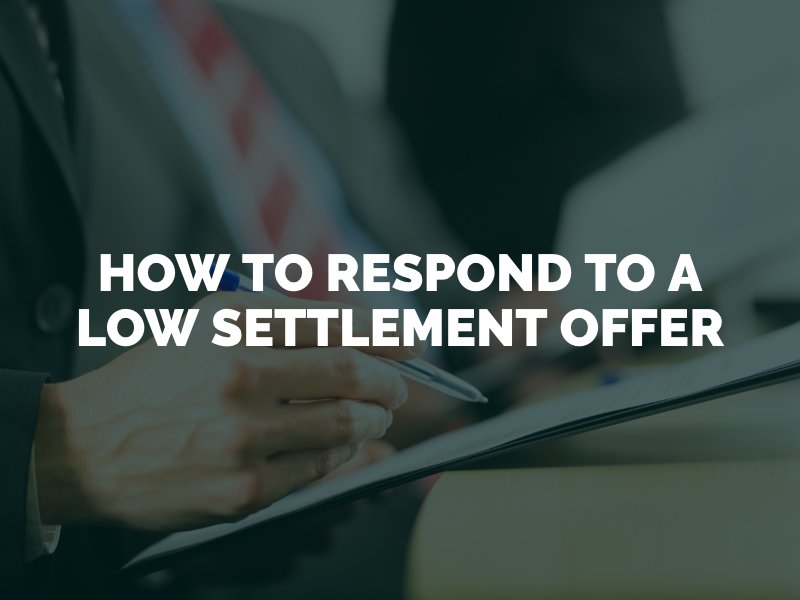Dealing with an insurance company is one of the most difficult aspects of a personal injury claim. Even if you succeed in proving someone else’s liability for your accident and injuries, you may then have to contend with a lowball settlement offer or other bad faith tactics from an insurance provider to ensure a fair outcome. Learn how to appropriately respond to a low settlement offer for the greatest odds of success during a personal injury claim.

Stay polite and professional when negotiating with an insurance claims adjuster, even if you believe he or she is trying to take advantage of you or is using bad faith tactics. Getting angry and yelling at the adjuster will not help your case and may even hurt your ability to obtain fair compensation. Your anger could position you as an unreliable witness and put you at a greater disadvantage during settlement negotiations. Try to remain calm and polite instead. Hire a Denver personal injury attorney to speak to insurance companies on your behalf if desired.
Respond to a low settlement offer with questions. Find out why the insurance claims adjuster evaluated your case the way he or she did. Call or email the claims adjuster with specific questions that break down where the offer came from. The insurance adjuster lawfully must give a reason if he or she denies your claim. The adjuster’s responses can guide you in how to respond with an appropriate and informed counteroffer. For example, if the adjuster estimated your losses based on incomplete injury documentation, you may be able to provide updated medical expenses or proof of lost wages to increase the offer.
Document everything. Documentation of your injuries, medical costs, lost wages and other damages can serve as evidence to support the value of your claim. The more evidence you collect, the stronger your claim to damages will be. You will have the paperwork backing up the amount you believe is fair and reasonable to cover your damages, making it more difficult for the insurance company to argue for a lower settlement. Presenting the facts, along with a documented paper trail, could force the insurance claims adjuster to give a better settlement offer.
When presented with a low settlement, respond in writing rather than over the phone. Written communication between you and the insurance company documents all correspondence. You may need to use these documents later if your case goes to trial. Explain where you disagree with the claims adjuster’s evaluation and why, supported with evidence such as your bills or pay stubs. Include a counteroffer of a reasonable amount you believe your case is worth, all in writing.
Do not let an insurance company pressure you into accepting a low offer. No law obligates you to say yes to the first, second or any settlement offer. You do not have to accept until you believe the insurance company is offering a fair amount. Common bad-faith insurance tactics to watch out for include excessively delaying your claim, denying benefits without explanation and offering an unreasonably low settlement. Even if an adjuster says it is the highest or final offer, do not accept until an attorney has reviewed your case.
An adjuster might also try to use his or her settlement authority to convince you to accept a low amount. The adjuster could allege that he or she only has the authority to offer the amount given – no more. This is a common negotiating tactic you should not believe. Counter the offer with a written letter supported by why you find the settlement unacceptable. Hire an attorney to help you strengthen your arguments and collect further evidence as to the value of your damages. An attorney can take over negotiations with a claims adjuster on your behalf for the best possible settlement.